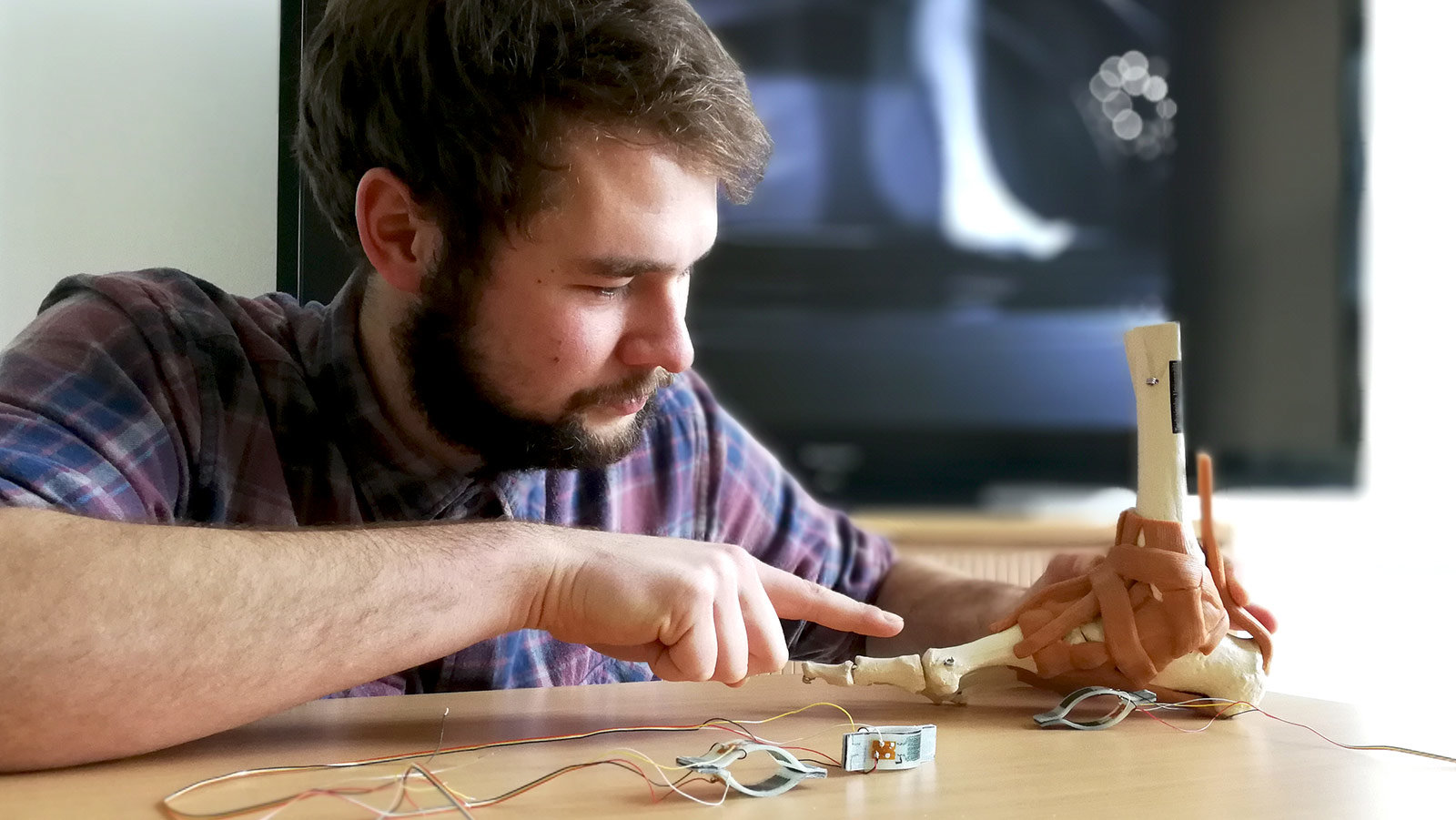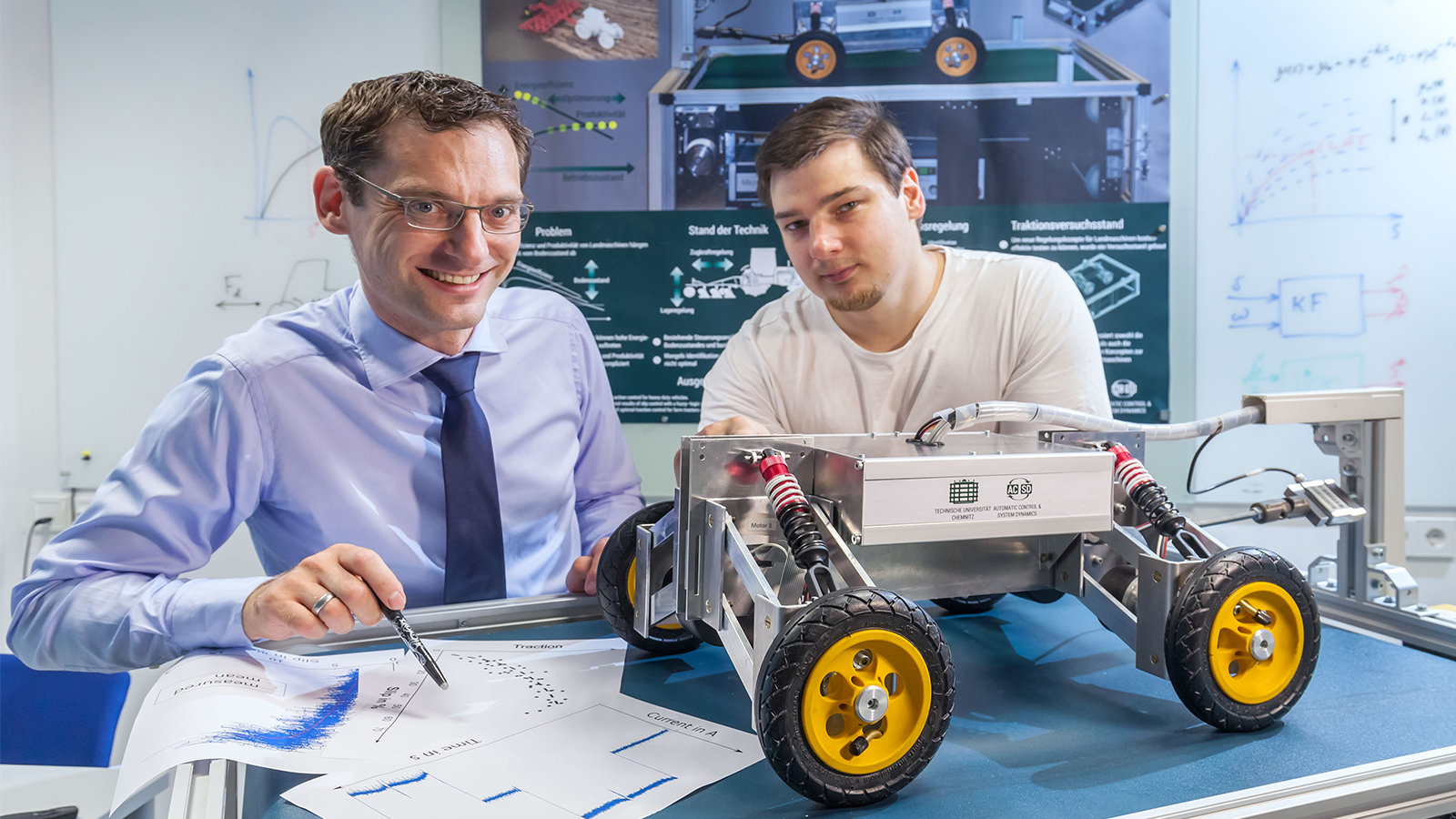Control and sensor technology provides impetus for food production and medical technology
Saxon State Ministry for Higher Education, Research and the Arts funds two research projects at Chemnitz University in the fields of life sciences and biotechnology – another cooperation project is to
-

Florian Ebrecht, research assistant at the Professorship of Human Locomotion, knows that healthy feet are the fundament of a healthy locomotor system. In the framework of the PAGESU project, he wants to get to the bottom of all this scientifically. Photo: Nicolai Kram -

Prof. Stefan Streif (left) and his employee Dr. Pavel Osinenko at a traction test stand, which served as a prototype for the yet to-be-developed sensor vehicle. Photo: Uwe Meinhold
On February 1st, 2018, two research projects in the fields of life sciences and biotechnology were launched at Chemnitz University of Technology. For this purpose, the Saxon State Ministry for Higher Education, Research and the Arts (SMWK) provides a research project funding in the amount of approx. 688.000 euros from federal state resources. Saxony’s State Minister for Higher Education, Research and the Arts Eva-Maria Stange: “By this, the SMWK consequently implements the coalition agreement between CDU and SPD, which states the continuation of the biotechnology initiative. Biotechnological research can and has to take on a multitude of social challenges.”
The first of the two funded research projects in Chemnitz is the interdisciplinary project “Patientenorientierte Gesundheitsversorgung des Bewegungsapperates” (short: PAGESU). The project aims to investigate foot arch deformation during daily activities. To do so the research groups aim to develop insoles with embroidered strain measurement sensors. “We know surprisingly little about our foot and its weight bearing capacities, especially during dynamic load scenarios”, Dr. Freddy Sichting, research assistant at the Department of Human Locomotion, and adds: “Together with our partner at the Department of Lightweight Structures and Polymer Technology we are confident to do something against this knowledge gap”. The funding opportunity allows the interdisciplinary research team to answer a broad range of research questions. Among other things those are the functional anatomy of the foot and the potentials of embroidered strain measurement sensor applications in the field of medical engineering.
The focus of the second project is already stated in its name: EiNES means “Effizienz- und Nachhalitgkeitssteigerung in der Produktion von Lebensmitteln und von nachwachsenden Rohstoffen mittels einer E-Mobility-basierten Sensortechnologie“. „Researchers of the Faculty of Electrical Engineering and Information Technology as well as of the Faculty of Mathematics will develop an e-mobility-based sensor technology for real-time soil condition assessment. The acquired information will help to improve process monitoring and optimize the agricultural operation and thus food production via condition-oriented control of the machine. Not only does it better protect the soil, but it also increases efficiency of food and of renewable resource production and simultaneously optimizes fuel consumption and thus CO2 emissions”, explains Prof. Stefan Streif, Head of the Automatic Control and System Dynamics Laboratory. The Saxon Agency for the Environment, Agriculture and Geology as well as the Saxon Agricultural Union AgroSax e.V. participate in the project.
Aside from the two already authorized projects, a third cooperation project of Chemnitz University and Fraunhofer Institute for Machine Tools and Forming Technology IWU is to be launched in April.
Information on the PAGESU project are available from Dr. Freddy Sichting from the Professorship of Human Locomotion, phone +49 371 531 38823, email freddy.sichting@hsw.tu-chemnitz.de
Information on the EiNES project are available from Prof. Stefan Streif, phone +49 371 531, email Stefan.streif@etit.tu-chemnitz.de
(Translation: Alissa Hölzel)
Matthias Fejes
14.02.2018




